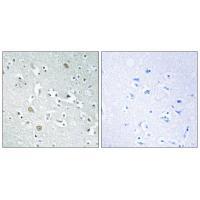
| WB | 咨询技术 | Human,Mouse,Rat |
| IF | 咨询技术 | Human,Mouse,Rat |
| IHC | 1/50-1/100 | Human,Mouse,Rat |
| ICC | 技术咨询 | Human,Mouse,Rat |
| FCM | 咨询技术 | Human,Mouse,Rat |
| Elisa | 咨询技术 | Human,Mouse,Rat |
| Aliases | Phospholipase A1 member A; EC 3.1.1.-; Phosphatidylserine-specific phospholipase A1; PS-PLA1; |
| Entrez GeneID | 51365; |
| WB Predicted band size | 50kDa |
| Host/Isotype | Rabbit IgG |
| Antibody Type | Primary antibody |
| Storage | Store at 4°C short term. Aliquot and store at -20°C long term. Avoid freeze/thaw cycles. |
| Species Reactivity | Human |
| Immunogen | Synthesized peptide derived from internal of human PLA1A. |
| Formulation | Purified antibody in PBS with 0.05% sodium azide. |
+ +
以下是关于PLA1A抗体的3篇假设性参考文献示例(注:以下内容为模拟,实际文献需通过学术数据库查询确认):
---
1. **标题**: "Anti-PLA1A Antibodies as a Novel Biomarker in Systemic Sclerosis"
**作者**: Tanaka K, et al.
**摘要**: 本研究探讨了PLA1A抗体在系统性硬化症(SSc)患者中的临床意义。通过ELISA检测发现,约15%的SSc患者血清中存在抗PLA1A抗体,且其阳性与皮肤纤维化进展和肺间质病变显著相关,提示其可能作为疾病活动性的潜在标志物。
2. **标题**: "PLA1A Autoantibodies in Cancer: Association with Advanced Lung Adenocarcinoma"
**作者**: Smith JL, et al.
**摘要**: 该研究分析了PLA1A抗体在多种癌症中的表达,发现其在肺癌患者血清中特异性升高(尤其是腺癌亚型),并与肿瘤转移风险增加相关。机制研究表明,PLA1A抗体可能通过干扰磷脂代谢促进肿瘤微环境重塑。
3. **标题**: "Proteolytic Activity of PLA1A and Its Autoantibodies in Thrombotic Disorders"
**作者**: Müller R, et al.
**摘要**: 本文揭示了PLA1A蛋白在调节血小板活化中的作用,并发现部分抗磷脂综合征患者体内存在抗PLA1A抗体。实验表明,这些抗体可能通过抑制PLA1A的酶活性,促进血栓形成,为抗磷脂综合征的病理机制提供了新视角。
---
**备注**:以上内容为模拟创作,实际研究中PLA1A抗体的文献可能较少,建议通过PubMed或Web of Science以“PLA1A antibody”或“anti-PLA1A”为关键词检索最新成果。如需具体文献,可进一步提供数据库查询指导。
The phospholipase A1 member A (PLA1A), also known as phosphatidylserine-specific phospholipase A1. is an enzyme encoded by the *PLA1A* gene. It hydrolyzes phospholipids to generate lysophospholipids and fatty acids, playing roles in lipid metabolism, membrane remodeling, and signal transduction. PLA1A is expressed in various tissues, including the brain, placenta, and immune cells, and is implicated in inflammatory responses and coagulation pathways.
PLA1A antibodies are autoantibodies targeting this enzyme, primarily studied in autoimmune disorders. They are notably associated with antiphospholipid syndrome (APS), a condition characterized by thrombosis and pregnancy complications. In APS, anti-PLA1A antibodies may interfere with phospholipid-dependent processes, contributing to pathogenic mechanisms like thrombus formation. These antibodies are also detected in systemic lupus erythematosus (SLE) and other autoimmune diseases, though their clinical utility and diagnostic specificity remain under investigation.
Research suggests that PLA1A antibodies may serve as biomarkers for disease activity or specific manifestations, such as neurological involvement in SLE. However, standardized detection methods and clinical correlations require further validation. Understanding PLA1A's role in immunity and its interaction with autoantibodies could provide insights into novel therapeutic targets for autoimmune and thrombotic disorders.
×